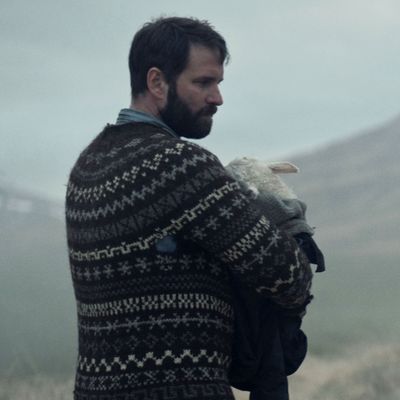
Lamb is about a strange thing that happens to two people who resolutely refuse to acknowledge it as anything other than normal. The tension between the absurd and the mundane is the heart of this doodle of a film, which is the directorial debut of Valdimar Jóhannsson, who wrote the script with the novelist and poet Sjón. The first time the sturdy fabric of life on the Icelandic sheep farm where the film takes place rips open, husband and wife Ingvar (Hilmir Snær Guðnason) and Maria (Noomi Rapace, who’s Swedish, but who lived in Iceland as a child) stare at each other in shocked silence. And then, with a tilt of an eyebrow, they incorporate this addition into their lives, still not exchanging a word. It’s not until Ingvar’s ne’er-do-well sibling Pétur (Björn Hlynur Haraldsson) turns up in the second act, having been ingloriously ejected from his life in the city in what seems to be a regular occurrence, that someone dares mention out loud that something unusual is going on. He’s quickly shushed, Ingvar telling him firmly that “There’s nothing for us to talk about.”
If it feels like I’m playing coy about what the inciting anomaly is, that’s only because the movie also plays coy with it at first. We’re given a series of teasing glances and half-obscured shots before finally getting a real look at a sight which, by that point, we’ve already formed a version of in our heads. What’s come into Ingvar and Maria’s lives is a compound creature with a human body and the head of a sheep, one born unceremoniously during an otherwise normal lambing season. The mongrel’s mother, separated from her baby, bleats piteously outside the couple’s house, until Maria, plagued by troubling dreams, drags the animal out into a field and shoots it. She’s determined to raise Ada, as she’s named the changeling, as her own, and Ingvar seems more than willing to go along with the arrangement. “What the fuck is this?,” Pétur asks his brother tersely after his first encounter with Ada, and Ingvar answers, simply, “Happiness.”
Lamb isn’t a horror movie. It’s more like a fairy tale, with all the darkness that most fairy tales have before they’re tidied up for contemporary consumption. The story fits into a tradition of childless couples finding otherworldly infants that stretches from Kaguya-hime, the princess discovered in the forest by a bamboo cutter and his wife in Japanese folklore, to Superman, the extraterrestrial found in a Kansas cornfield by the Kents in what, I guess, is folklore of the American kind. And like all of these stories, the understanding that something will eventually come calling for these miraculous offspring is always looming over the proceeding — Ada came from somewhere, after all, beyond the womb of a slaughtered sheep. Still, for a long stretch, Lamb is about life on the farm. Jóhannsson has a way with wordlessness that goes beyond the film’s concept and undeniably Scandinavian deadpan sensibility to inform the way he transmits essential information about his characters.
That fact that the couple’s experienced heartbreak in trying to conceive is conveyed, for instance, by the way that Ingvar pulls a crib out of storage in the barn and sets it up for Ada. The lulls between an idle conversation over breakfast suggests that Ingvar would be content with a future of just the two of them on the farm, while Maria yearns for more. The way that Pétur touches Maria’s face when they’re alone makes it clear, before he says anything, that they’ve slept together before, and that he’d like it to happen again, while she’d prefer to move on. Lamb is deft enough with these details that it’s frustrating that there’s so little to it, that it feels like it could have been a great short instead of an underwhelming feature, and that it leans more and more heavily on its unsettling central creation. And Ada’s certainly memorable, especially once she’s girl-sized and dressed in practical sweaters. She understands speech, but at the same time the tiny sounds and the expressions she makes are entirely animal, with a ruminant’s blankness that isn’t cute or easy to anthropomorphize.
That’s the point in Lamb — that even in this outpost of domestication and agriculture and mankind’s dominance over the land and the elements, nature is not so easily claimed. But it’s not a point that the movie seems to feel all that passionately about. By the time the final act rolls around, Lamb approaches the idea that there’s a price that must be paid with a shrugging diffidence rather than impending doom. It’s such an underwhelming conclusion to a film with such a compelling start. You might start to wonder if the taciturn nature of the project is less a stylistic choice and more an indication that it just doesn’t have that much to say.
More Movie Reviews
- The Thriller Drop Is a Perfect Addition to the Bad-First-Date Canon
- The Accountant 2 Can Not Be Taken Seriously
- Another Simple Favor Is So Fun, Until It Gets So Dumb


